#java technology
Explore tagged Tumblr posts
Photo
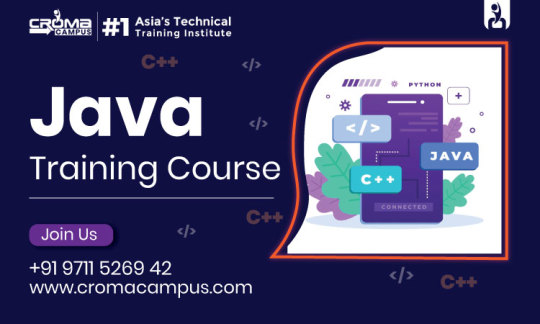
If you are searching for Java Online Training in India, then you can enroll in Croma Campus which provides live project-based practical training.
0 notes
Text


UniverSun 95 (1995)
435 notes
·
View notes
Text

Definitely, there is a time for everything.
I was desperate not long ago, so I decided to quit all my hobbies to study really hard, or at least 4 hours a day like I did during my graduation (I graduated in IT Management). The main thing I discovered is that even if I don't get the job I want, the person I will become—someone with real knowledge of the Software Engineering process, from the bare bones to deployment—will be worth it and enjoyable to become.
Because of this, I started to perform better in interviews and made new friends on Discord servers for programming languages.
Okay, I’m not saying that everyone will be surrounded by friends by studying like this, we need a pretty time alone to accomplish many things. But the point is, the more you talk about it, the more you attract things related to it.
#coding#developer#linux#programmer#programming#software#software development#student#study aesthetic#study blog#study#studyblr#study motivation#studying#student life#book#notes#studynotes#software engineering#information technology#java#kafka#apachekafka
39 notes
·
View notes
Text
AI WORLD RPG Game Unity
using UnityEngine;using System.Collections; public class PlayerController : MonoBehaviour{public float moveSpeed = 5f;public Rigidbody2D rb;public Animator animator;private Vector2 movement; void Update() { // Get movement input movement.x = Input.GetAxisRaw("Horizontal"); movement.y = Input.GetAxisRaw("Vertical"); // Set animation parameters animator.SetFloat("Horizontal",…

View On WordPress
#inspiring knowladge#inspiring knowledge#ai world#story writing ai technology ai blog#c#coding#java#net#programming
3 notes
·
View notes
Text
How to get into Coding!
Coding is very important now and in the future. Technology relies on coding and in the future you will need to know how to code to get a high-paying job. Many people consider having Computer Science field-related jobs, especially in AI. What if you are interested it in general or as a hobby? What if you don't know what you want to do yet for college?
Pick a language you want to learn: Personally, I started out with HTML and CSS. I recommend if you want to do web design HTML and CSS are good languages to start with. Otherwise, start with JavaScript or Python.
2. Find Resources: Basically you want to look at videos on YouTube, and take classes that have coding like AP CSP, AP CS A (harder class), Digital Information Technology, etc. You can also attend classes outside in the summer like CodeNinjas and use websites like code.org, freeCodeCamp, and Codecademy. Also, ask your friends for help too! You can find communities on Reddit and Discord as well.
3. Start Practicing: Practice slowly by doing small projects like making games for websites and apps. You can work with friends if you are still a beginner or need help. There's also open-source coding you can do!
4. Continue coding: If you don't continue, you will lose your skills. Be sure to always look up news on coding and different coding languages.
5. Certifications: If you are advanced in coding or want to learn more about technology, you can do certifications. This can cost a lot of money depending on what certification you are doing. Some school districts pay for your certification test. But if you take the test and pass, you can put it on your resume, and job recruiters/interviewers will be impressed! This can help with college applications and show initiative if you want a computer science degree. This shows you are a "master" of the language.
#tech#coding#learning#education#hobby#fun#jobs#high school#college#university#youtube#reddit#certification#javascript#java#python#html css#css#html#ap classes#ap csp#information technology#technology#computer science#programming#software engineering#web design#web development#discord chat#discord server
9 notes
·
View notes
Text

Example of Java List
Let us see the example of Java List:
#java#programming#javaprogramming#code#coding#engineering#computer#computerscience#computertechnology#software#softwaredevelopment#education#technology#javalist#list#online
4 notes
·
View notes
Text
youtube
Data Structure and Algorithms in JAVA | Full Course on Data Structure
In this course, we are going to discuss Data Structures and Algorithms using Java Programming. The data structure is a way to store and organize data so that it can be used efficiently. It is a set of concepts that we can use in any programming language to structure the data in the memory. Data structures are widely used in almost every aspect of computer science i.e. operating systems, computer science, compiler design, Artificial Intelligence, graphic,s and many more. Some examples of Data structures that we are going to cover in this course are arrays, linked lists, stack, queue, Binary Tree, Binary Search Tree, Graphs, etc. Apart from knowing these data structures, it's also important to understand the algorithmic analysis of a given code. Different Sorting and searching techniques will be talked about with their implementation in java programming. Lastly, this course contains information on the Greedy approach, Dynamic approach, and divide and Conquer approach to programming.
#youtube#free education#education#educate yourselves#technology#educate yourself#data structures#data analytics#Data Structure and Algorithms in JAVA#javaprogramming#Data Structure and Algorithms#how to think like a programmer#programming classes#programming
3 notes
·
View notes
Text
Which is better full stack development or testing?

Full Stack Development vs Software Testing: Which Career Path is Right for You?
In today’s rapidly evolving IT industry, choosing the right career path can be challenging. Two popular options are Full Stack Development and Software Testing. Both of these fields offer unique opportunities and cater to different skill sets, making it essential to assess which one aligns better with your interests, goals, and long-term career aspirations.
At FirstBit Solutions, we take pride in offering a premium quality of teaching, with expert-led courses designed to provide real-world skills. Our goal is to help you know, no matter which path you choose. Whether you’re interested in development or testing, our 100% unlimited placement call guarantee ensures ample job opportunities. In this answer, we’ll explore both career paths to help you make an informed decision.
Understanding Full Stack Development
What is Full Stack Development?
Full Stack Development involves working on both the front-end (client-side) and back-end (server-side) of web applications. Full stack developers handle everything from designing the user interface (UI) to managing databases and server logic. They are versatile professionals who can oversee a project from start to finish.
Key Skills Required for Full Stack Development
To become a full stack developer, you need a diverse set of skills, including:
Front-End Technologies: HTML, CSS, and JavaScript are the fundamental building blocks of web development. Additionally, proficiency in front-end frameworks like React, Angular, or Vue.js is crucial for creating dynamic and responsive web interfaces.
Back-End Technologies: Understanding back-end programming languages like Node.js, Python, Ruby, Java, or PHP is essential for server-side development. Additionally, knowledge of frameworks like Express.js, Django, or Spring can help streamline development processes.
Databases: Full stack developers must know how to work with both SQL (e.g., MySQL, PostgreSQL) and NoSQL (e.g., MongoDB) databases.
Version Control and Collaboration: Proficiency in tools like Git, GitHub, and agile methodologies is important for working in a collaborative environment.
Job Opportunities in Full Stack Development
Full stack developers are in high demand due to their versatility. Companies often prefer professionals who can handle both front-end and back-end tasks, making them valuable assets in any development team. Full stack developers can work in:
Web Development
Mobile App Development
Enterprise Solutions
Startup Ecosystems
The flexibility to work on multiple layers of development opens doors to various career opportunities. Moreover, the continuous rise of startups and digital transformation initiatives has further fueled the demand for full stack developers.
Benefits of Choosing Full Stack Development
High Demand: The need for full stack developers is constantly increasing across industries, making it a lucrative career choice.
Versatility: You can switch between front-end and back-end tasks, giving you a holistic understanding of how applications work.
Creativity: If you enjoy creating visually appealing interfaces while also solving complex back-end problems, full stack development allows you to engage both creative and logical thinking.
Salary: Full stack developers typically enjoy competitive salaries due to their wide skill set and ability to handle various tasks.
Understanding Software Testing
What is Software Testing?
Software Testing is the process of evaluating and verifying that a software product or application is free of defects, meets specified requirements, and functions as expected. Testers ensure the quality and reliability of software by conducting both manual and automated tests.
Key Skills Required for Software Testing
To succeed in software testing, you need to develop the following skills:
Manual Testing: Knowledge of testing techniques, understanding different testing types (unit, integration, system, UAT, etc.), and the ability to write test cases are fundamental for manual testing.
Automated Testing: Proficiency in tools like Selenium, JUnit, TestNG, or Cucumber is essential for automating repetitive test scenarios and improving efficiency.
Attention to Detail: Testers must have a keen eye for identifying potential issues, bugs, and vulnerabilities in software systems.
Scripting Knowledge: Basic programming skills in languages like Java, Python, or JavaScript are necessary to write and maintain test scripts for automated testing.
Job Opportunities in Software Testing
As the demand for high-quality software increases, so does the need for skilled software testers. Companies are investing heavily in testing to ensure that their products perform optimally in the competitive market. Software testers can work in:
Manual Testing
Automated Testing
Quality Assurance (QA) Engineering
Test Automation Development
With the rise of Agile and DevOps methodologies, the role of testers has become even more critical. Continuous integration and continuous delivery (CI/CD) pipelines rely on automated testing to deliver reliable software faster.
Benefits of Choosing Software Testing
Job Security: With software quality being paramount, skilled testers are in high demand, and the need for testing professionals will only continue to grow.
Quality Assurance: If you have a knack for perfection and enjoy ensuring that software works flawlessly, testing could be a satisfying career.
Automated Testing Growth: The shift toward automation opens up new opportunities for testers to specialize in test automation tools and frameworks, which are essential for faster releases.
Flexibility: Testing provides opportunities to work across different domains and industries, as almost every software product requires thorough testing.
Full Stack Development vs Software Testing: A Comparative Analysis
Let’s break down the major factors that could influence your decision:
Factors
Full Stack Development
Software Testing
Skills
Proficiency in front-end and back-end technologies, databases
Manual and automated testing, attention to detail, scripting
Creativity
High – involves creating and designing both UI and logic
Moderate – focuses on improving software through testing and validation
Job Roles
Web Developer, Full Stack Engineer, Mobile App Developer
QA Engineer, Test Automation Engineer, Software Tester
Career Growth
Opportunities to transition into senior roles like CTO or Solution Architect
Growth towards roles in automation and quality management
Salary
Competitive with wide-ranging opportunities
Competitive, with automation testers in higher demand
Demand
High demand due to increasing digitalization and web-based applications
Consistently high, especially in Agile/DevOps environments
Learning Curve
Steep – requires mastering multiple languages and technologies
Moderate – requires a focus on testing tools, techniques, and automation
Why Choose FirstBit Solutions for Full Stack Development or Software Testing?
At FirstBit Solutions, we provide comprehensive training in both full stack development and software testing. Our experienced faculty ensures that you gain hands-on experience and practical knowledge in the field of your choice. Our 100% unlimited placement call guarantee ensures that you have ample opportunities to land your dream job, no matter which course you pursue. Here’s why FirstBit is your ideal training partner:
Expert Trainers: Learn from industry veterans with years of experience in development and testing.
Real-World Projects: Work on real-world projects that simulate industry scenarios, providing you with the practical experience needed to excel.
Job Assistance: Our robust placement support ensures you have access to job openings with top companies.
Flexible Learning: Choose from online and offline batch options to fit your schedule.
Conclusion: Which Career Path is Right for You?
Ultimately, the choice between full stack development and software testing comes down to your personal interests, skills, and career aspirations. If you’re someone who enjoys building applications from the ground up, full stack development might be the perfect fit for you. On the other hand, if you take satisfaction in ensuring that software is of the highest quality, software testing could be your calling.
At FirstBit Solutions, we provide top-notch training in both fields, allowing you to pursue your passion and build a successful career in the IT industry. With our industry-aligned curriculum, expert guidance, and 100% placement call guarantee, your future is in good hands.
So, what are you waiting for? Choose the course that excites you and start your journey toward a rewarding career today!
#education#programming#tech#technology#training#python#full stack developer#software testing#itservices#java#.net#.net developers#datascience
2 notes
·
View notes
Note
Hi! I have just recently deciding to switch careers and leave the vet industry , go into tech. Have spent past 2 years in tech school to become a vet assistant but after being in my field, I always wondered how it would be like to have a career in tech, ive always thought for so long that being in tech comes w Math and science and i suck at both 🤣🤣🤣. so I’m deciding to enroll myself in a completely online program to become an IT tech yet i have always admired hacking and coding so without getting sooo much into it, which leads me to my question:
- what do I have to do to be in the code career?
- do I have to go to boot camp out of my state or should look into going online completely?
- is coding beginner friendly especially as someone who doesn’t have ABSOLUTE NO IDEA about coding?
Please let me know and I love that I have found a community of women jn the tech industry, it’s pretty inspiring which why I want to go into the tech career.
Hi Stone, first of all welcome to our small and growing community.
I'm glad you're giving yourself this chance to try technology and see if it's for you or go back to vet or even go to art(yes I stalked you UEUHEHUEHUE) and I also thank you for finding my opinion relevant.
As you said that you wanted a career and that you are interested in coding and hacking, here you need to choose which one to prioritize. Because whether back-end, front-end, mobile, fullstack or cybersecurity there will be a lot to study, practice, make mistakes and practice again.
Here I give an addendum that if you don't know what these areas mean in technology, I recommend doing a search, reading and watching videos on youtube about it to see what might please you.
So based on what you've told me, again I think the best first step is to know what you want to prioritize and what you want to make money from.
Because trust me, you won't be able to study everything together at the same time. And if you manage to find an hour, there will be a burnout, so take it easy my friend. (from personal experience)
Even more so if you want a job, it's best to focus on 1 and then move on to others. Then find out what might be best for you / what you most identify with.
I also like hacking, I have books and I have already found courses. But this is something I want to study as a hobby and a safety measure (after all, there's no shortage of motherfuckers doing shit with others with that knowledge). So I put it in the background. Because my priority is money and hacking has work, but not in my country.
Now about entering the code career. Despite being a junior/student, I've seen a lot and I've also learned in these 2 years in the technology community in my country and watching you from the outside, so I can have a more mature view to help you with that.
So let's go:
1) - To know what you need to do to enter your career in code, you need to know how the technology market is in your country.
Because with all these layoffs, we have a lot of professionals with experience and academically well qualified and depending on the country, we currently have more demand for professionals than job offers. (Here in Brazil this is happening, because the layoffs in North America reflected here).
And here I don't want to discourage you, I just want to give you a realistic parameter for you to enter the area without illusions and not get frustrated like me and a bunch of people on the internet. (I wish someone had guided me like that). Because what we have most on social media is people making it seem like programming is easy and getting a job is even easier, or that you're going to earn A LOT since you're just a junior and THAT'S NOT THE REALITY..
BUT all the effort pays off in the end.
Within that, here I think it's cool that you try to observe what vacancies in your country ask for juniors/interns.
From Skills like knowing python to asking college or accepting bootcamp. See what's most in demand out there and within that see if you like what's in demand.
I tell you this, because here in Brazil, for example, we currently have more vacancies for internships (and here you need to be enrolled in a college to do an internship) than for juniors without college and only with bootcamps. So if we want a job around here, the first thing is to go to college and not be completely self-taught. So again, research and study your country's technology market.
In my conception TODAY getting a job in programming without college will be 10x more difficult than in 2020 for example, things have changed. The market now is not lacking developers, quite the contrary, now it has hight demands from developers but not for JOBS.
What the market wants most are senior people (and I've seen seniors I know saying that after layoffs even for them it's more willing to get a job, again supply and demand), but there are still opportunities for us beginners, in some countries there are more and in others less.
Speaking in the sense of the United States from what I observed from the US (content producers and twitter) + my experiences here in Brazil.I don't know the current situation of the technology market in Africa, the rest of Latin America , Asia and Europe.
Of course, you can be lucky and succeed without , but I, for one, got tired of believing that I would be lucky and be one of those people who succeed and changed my strategy to get a job.
Or you could also join a job-guaranteed bootcamp. Check how it works and if you have this type in your country.
And here we come to your second question.
2) The answer is it depends.
For example, will this bootcamp in your state guarantee you a job or is it possible to do an internship at a company or will it connect you with companies after the program?Or is he recognized by technology companies in your state?
If so, I would recommend doing it and dedicating yourself to getting in.
Because look, if they guarantee you an job is even better , you'll just have to study and do what they tell you to get your job.
But if you don't guarantee it, but this training has merit/respect in the market, it also pays off.
Here, I wanted to take the opportunity and talk about apprenticeship.
In our community we have our queen @xiacodes @xiabablog (it's the same person), she did an apprenticeship and today she is a junior developer in UK .
She shared her journey on her blog and is also the most engaged and resource sharing person in our community.
Here I would like to say that FOR ME Apprenticeship is one of the smartest strategies today to get into the technology market.
I myself will start on a Monday and it was my solution to get a job in code by the end of the year. (I'll talk about this in another post too)
So I recommend looking for apprenticeship in your country / state and how they work there.
And obviously observe and read the rules of the program to see if there are any catches that put you in absurd debt or contractual fines.
And see if you can handle it if you have the possibility.
Here I give an addendum that if you find an apprenticeship but that you will earn little in the beginning, for you to analyze well before saying no. Because salary we can evolve after we have experience, the important thing for us juniors/students is to get the first experience and the rest later becomes easier. (At least that's what the Mid /seniors I know say)
Now if in your country you don't have this kind of opportunity, I would recommend trying to see if it would be possible to do bootcamp/online courses + college to get an internship.
And you don't even have to start with paid courses, in my opinion if the bootcamp won't guarantee you a job, it's not worth paying for it. We have a lot of free resources on the internt (youtube biggest school) .
But it's up to you.
Free Courses:
-Freecodecamp
-Odin project (And it has both fullstack with ruby and with node.js. )
For me, paying will only pay off when you don't find quality resources for what you want to study. So I would advise you to always think about whether it pays off or not.
Accessible paid courses:
- Codecademy
- Udemy (there are good courses there and there are always promotions)
+++ Here I also wanted to talk about knowing that public colleges (100% free) are not possible in all countries or when they are, they are very elective and difficult to get into for poor people as it is here in Brazil.
But here despite that, studying A LOT to pass the exams and having worked to save money and support yourself until you get scholarships to support yourself (and if you do), you manage to get into the best colleges that are free and that is more viable than being poor and being able to pay for college in the US, for example.
So I know that it might not be very viable depending on where you live and whether or not you are a resident of the country.
So I don't know if college can be an affordable thing for you, but if not that you can find the best strategy to achieve your financial prosperity in technology!
But if you are from the United States for example, this week I discovered this spotify program: https://fellowship.spotify.com/
The one where they only hire people with bootcamps and not colleges and open in the summer there.
And despite the layoffs, I still think there are more entry level openings there than here HUEHUEEHEU.
3) What do you mean by friendly?
If you mean easy, no, she probably won't be friendly to you at all AND THAT'S OKAY.
As you yourself said that you know absolutely nothing, it will be natural for you to have difficulty, to think about giving up and to make a lot of mistakes to get it right.
It's going to be a process of failing and trying again and again.
NOTHING IS EASY. And since you've already taken a veterinary course, I think you already know that things are really difficult. So this is another reminder that it won't be any different here.
BUT it will end well because EVERYTHING IS LEARNED.
And that also goes for math, if you ever have to deal with it (and if you go to cs college you will) you will make a lot of mistakes, but you will succeed, because EVERYTHING IS LEARNED based on trial and error.
And that doesn't mean you're bad or stupid, just that you're learning something completely from scratch. It won't be overnight that you will understand, it may take months or years, but persisting you will succeed. THIS IS NORMAL.
I cried (literally) to do conditional algorithms in 2021, I banged my head in books, said I would never make it and felt like the biggest dumbass in the world and today 2023 are the easiest things for me. I have no problem making them.
And that was only possible because I didn't give up.
Here I wanted to advise you to start your programming studies with low expectations, to help you manage your frustrations and maybe burnouts. It won't be overnight that you will become the best programmer and do many projects at the level of a senior developer or the people who do tutorials on youtube.
They will be small steps that lead you to your goals in studies. Again, constants.
There are people who could get their ek code jobs in 3 to 6 months of study.
BUT FOR ME, currently having a plan to get an opportunity between 2 years and 4 years (if you actually go to college) study is the healthiest way to pursue your studies and goals. If you get it sooner, even better for you, but if not, you'll be fine with yourself because it's within the period you stipulated.
Finally, I ask you not to take anything I say as absolute truth.
Question what you read Take what I said, analyze it and see how it works in your reality.
I also recommend trying to find women in technology from your country on linkedin and see if they can help you with tips and so on. I feel very good knowing so many Brazilian women in tech since I did this, my network there is composed only of them precisely to create a place without judgment but of welcome and inspiration.
Well, I invested about 3 hours answering the best way I can, I hope you read it and that it helps you.
Anything, if you want to talk more, you can call me in the chat, I'll take a while but I'll answer.
I wish you good studies, discernment to see which is the best path for you and that you stay well! Lots of protection in studies and career.
#womanintech#codeblr#software development#woman in stem#coding#studyblr#studyblog#software engineering#code#algorithms#juniordeveloper#studystudystudy#studyblr community#learn to code#100 days of code#javascript#html#java#developer#technology#ask response#thanks for the ask!#ask to tag#womanshelpswomans
22 notes
·
View notes
Text

Deliver personalized user experiences with machine learning in your app. Understand your users better and give them exactly what they need. 🔗Learn more: https://greyspacecomputing.com/custom-mobile-application-development-services/ 📧 Visit: https://greyspacecomputing.com/portfolio
#GreySpaceComputing#MachineLearning#AppDevelopment#Dubai#SaudiArabia#artificialintelligence#ai#datascience#python#technology#programming#computerscience#dataanalytics#pythonprogramming#developer#datascientist#javascript#programmer#java#innovation#ml#coder#robotics#webdevelopment#analytics
2 notes
·
View notes
Link
Java is the best highly demanding object-oriented programming language. Java is used for web apps, mobile apps, games, and much more software. If you want to learn Java programming language, you can enroll in Java Online Training in India from Croma Campus. They are providing the latest and updated training course modules designed by 12+ years of experienced Java experts. They also offer live project-based practical training according to the candidates.
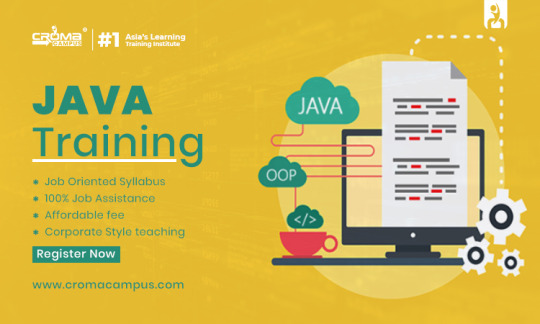
0 notes
Text
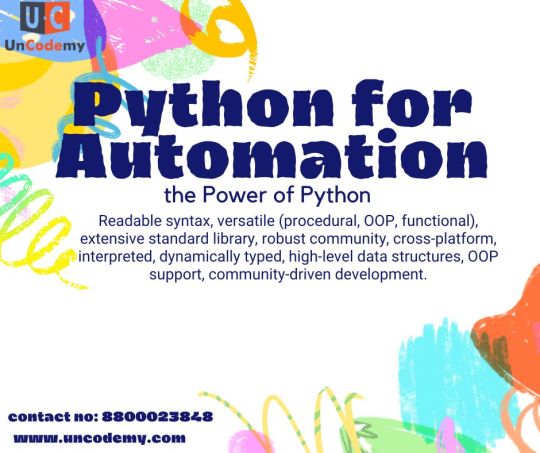
Discover how to use Python for web scraping, a potent method of obtaining data from websites. BeautifulSoup and Requests are two Python packages that make this process easier and allow for the smooth parsing of HTML structures.
#Best python course in kanpur#python#programming#coding#java#javascript#programmer#developer#html#snake#coder#code#computerscience#technology#css#machinelearning#pythonprogramming#linux#ballpython#php#datascience#reptile#snakes#reptiles#snakesofinstagram#software#reptilesofinstagram#webdevelopment#webdeveloper#tech
8 notes
·
View notes
Text
From 'Write Once, Run Anywhere' to Strong Security: The Java Advantage
Java, a programming language and technology ecosystem, has solidified its place in the digital world as a versatile and powerful tool. With its "Write Once, Run Anywhere" capability and an extensive array of features, Java has been instrumental in diverse domains, from mobile app development to building enterprise-level systems. This blog explores the strengths of Java, including its portability, robustness, vast ecosystem, and the thriving community that supports it. We will also discuss the value of structured training and the role of ACTE Technologies in nurturing your Java skills. By the end of this journey, you'll have a deep appreciation for the enduring excellence of Java and its role in the ever-evolving tech industry.
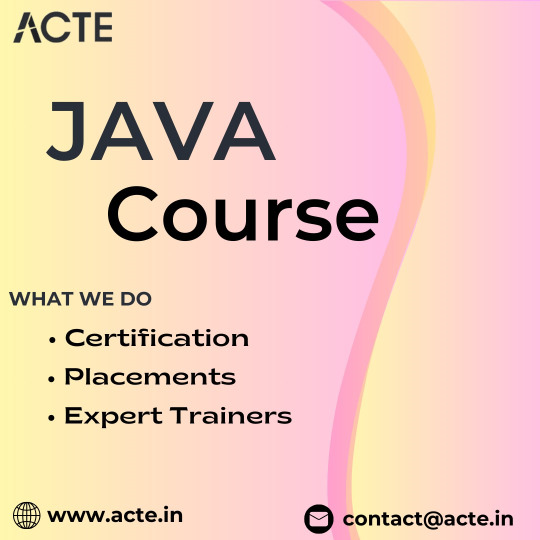
The Power and Versatility of Java:
1. Portability and Cross-Platform Compatibility:
Java's claim to fame, "Write Once, Run Anywhere," is not just a marketing slogan. It's a fundamental principle of Java that sets it apart. This feature is made possible by the Java Virtual Machine (JVM), which allows Java code to run on any platform that has a compatible JVM. This portability has been a game-changer, especially in a world where a diverse range of devices and operating systems coexist. Whether it's Windows, macOS, or Linux, Java applications run seamlessly, eliminating compatibility issues and reducing development time and effort.
2. Robust and Secure:
Java's architecture prioritizes robustness and security. It employs strong type checking, automatic memory management (garbage collection), and comprehensive exception handling. These features make Java code less prone to common programming errors and vulnerabilities. For businesses and organizations where system reliability and data security are critical, Java's robustness and built-in security mechanisms make it a go-to choice. Critical systems, such as banking applications, rely on Java to ensure the highest level of protection against errors and threats.
3. Vast Ecosystem:
The Java ecosystem is vast and varied. It includes an extensive library of classes, frameworks, and tools that cater to a wide range of application development needs. Some of the notable components of this ecosystem include:
Java Standard Library: Java's standard library provides a wealth of pre-built classes and utilities for common programming tasks, simplifying development.
Enterprise JavaBeans (EJB): For enterprise-level applications, EJB offers a framework for building scalable, distributed, and transactional components.
JavaServer Pages (JSP) and Servlets: These technologies enable the development of dynamic web applications, making Java a popular choice for web development.
Spring Framework: Spring is a comprehensive framework for building enterprise-level applications, offering features like dependency injection, aspect-oriented programming, and more.
Android Development: Java serves as the primary language for developing Android mobile applications, further expanding its reach.
4. Community and Support:
Java's success is not only due to its technical prowess but also its thriving community of developers, enthusiasts, and experts. This community-driven approach ensures that Java remains relevant, up-to-date, and aligned with industry best practices. Developers can find a wealth of resources, forums, and collaborative environments where they can learn, share knowledge, and solve challenges. The community's collective wisdom and problem-solving spirit have contributed to the continuous evolution of Java.
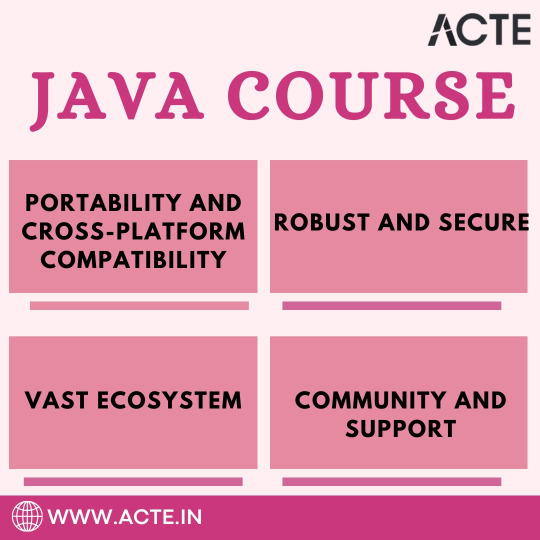
Java's enduring excellence is a testament to its portability, robustness, vast ecosystem, and strong community support. If you're looking to harness the potential of Java and embark on a journey of learning and mastery, consider exploring the Java training programs offered by ACTE Technologies. With dedication and the right resources, you can leverage Java's capabilities and contribute to the ever-evolving tech landscape.
Java has stood the test of time, offering unparalleled portability, robustness, a rich ecosystem, and a vibrant community. Whether you're building enterprise-level applications or dynamic web services, Java remains a reliable choice. ACTE Technologies' structured training can help you unlock the full potential of Java, enabling you to thrive in the dynamic tech industry.
8 notes
·
View notes
Text

AR or Augmented Reality and VR or Virtual Reality are the technical inventions that help live our imaginations before our eyes through simulations. AR/VR can be programmed with IoT objects to offer optimal audio-visual experiences that can rival or replicate a physical world without the help of any tangible media.
But, how to program these elements?
The popular programming languages help you build the simulations that bring AR/VR tech to life for the audience. Languages like C#, Python, JavaScript, JAVA, Swift, C++, Rust, and APIs like WebGL allow developers to build the right AR/VR for the users.
Are you willing to build AR/VR tech for your business? Hire Augmented Reality Developers or Virtual Reality Developers via Remote72.
#ar vr technology#augmented reality#virtual reality#app development#developer#programming#software engineering#software#ar vr development services#python#java#javascript#webgl#developers#iot#iot tech#internetofthings#technology#tech
2 notes
·
View notes
Text
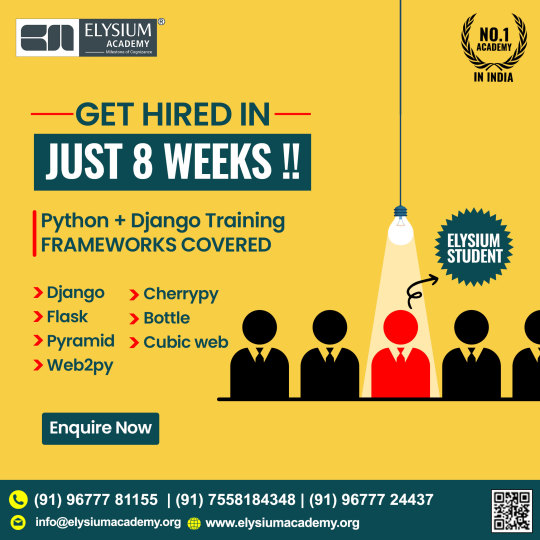
✨ Discover the perfect blend of Python 🐍 and Django 🌐 expertise with Elysium Academy's cutting-edge training framework! 🎉
✨ Dive deep into Python +Django mastery through engaging tutorials, personalized mentorship, and practical exercises. 🌟
🌟 Elevate your coding skills in just 8 weeks and unlock endless possibilities in the digital realm. 🌟
Join us now! 🚀
For Additional Info🔔 🟢Whatsapp: https://wa.me/9677781155 , https://wa.me/7558184348 , https://wa.me/9677724437 📨Drop: https://m.me/elysiumacademy.org 🌐Our website: https://elysiumacademy.org/networking-course-certification/ 📌Live Visit: shorturl.at/tMO45 🔖Appointment: https://elysiumacademy.org/appointment-booking/
#elysiumacademy#no1academy#ittrainingcourses#jobassitance#tesbocourse#programming#coding#programmer#python#developer#javascript#technology#code#java#coder#html#software#tech#css#webdeveloper#webdevelopment#softwaredeveloper#programmers
3 notes
·
View notes
Text

Java main() method
Let us see the description of Java main() method:
#java#programming#javaprogramming#code#coding#engineering#computer#computerscience#computertechnology#software#softwaredevelopment#education#technology#main#method#online
2 notes
·
View notes